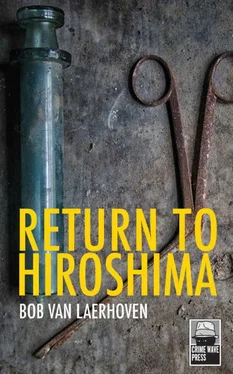Takeda’s bosses didn’t have to look far for an explanation of his inconsistent behaviour. He was half foreigner, not a full-blood Nippon. His languages skills, general submissiveness and enthusiasm were useful, but he was never going to really belong .
Takeda watched the days come and go. There was something chained up inside him, something he was afraid to let loose. Sometimes he felt like trashing the tiny flat they lived in. His mother, Barbara Gerressen, learned to speak fluent Japanese in the women’s camp and after the war returned to Japan with her infant son to work as a translator for Philips Electronics Japan. When he was a teenager, Takeda had asked her why she had come to live in the country of the man who had raped her. A slap in the face was his answer. She was diagnosed with multiple sclerosis at the age of forty-six. For the time being, she wasn’t ready for a wheelchair, but she found it difficult to take care of herself. Takeda and his wife saw it as their duty to look after her. Takeda passed his days with a gentle but unhappy wife and a bitter mother who hated her life and predicted she was going to choke to death when the sickness reached its final phase and attacked her lungs.
On May 18th 1973, Takeda took a call from his wife while he was at work. Barbara Gerressen had tried to commit suicide and had been rushed to the hospital. She had overdosed on painkillers. Takeda completed his working day with mechanical precision. His mother had seemed indestructible, a cold indifferent lump of stone perhaps, but still his rock. Now she turned out to be just as human as everyone else. He said nothing to his colleagues, but much to their surprise he joined them that evening at the bar after work and knocked back as many glasses as they did. His wife was already asleep when he got home. He opened the door to his mother’s tiny bedroom, where there was barely enough room for a bed and a wardrobe, and lay down on the bed. He pictured to himself being back in his mother’s womb and tried to share her feelings towards the camp guards, how she hated and feared them. It may have been the booze, but his experiment worked. Takeda sensed a rage begin to surface that made his limbs tingle. It was so overpowering, gave him so much satisfaction , that he could no longer sleep. He got up and rummaged around in the wardrobe in search of old, faded photos of the camp his mother had taken when she returned three years after the war with a delegation from the Netherlands. She had wanted to confront her past, but when she returned she was sullen and had little to say. There wasn’t much love in evidence between mother and son, not on the surface at least, but Takeda had to admit that she had never treated him badly. Barbara Gerressen was a woman who kept her emotions to herself and didn’t let other people touch her. He finally found the photos in a metal box. A chain with Japanese military dog-tags was lying at the bottom of the box, engraved with a service number, regiment and company.
No name.
Japanese soldiers didn’t have a name in the Second World War.
Hashima Island – Norikazu and Yori – evening, March 17 th1995
Norikazu arrived late on Hashima Island and made his way to the eagle’s nest in spite of the darkness. Yori takes the stairs up to the roof and looks out over the white-crested waves and the full moon projecting a tunnel of light onto the surface of the sea. Behind her a mishmash of rectangular concrete apartment buildings that used to house the miners, joined together by stairs and corridors, a decaying world of long forgotten hopes and dreams. Yori has spent the last couple of days wandering around the island. There are no trees to be seen, no green, no life. Hashima was a rock on top of an immense seam of coal. Now it’s one gigantic haunted house.
The clouds are low in the sky and a strong wind pummels her body. She can’t see the water below from where she’s standing, but she pictures it crashing against the seawall, hissing and bubbling, muttering to itself: I’ll break you one of these days, I’ll break you. The giant Yori still calls Rokurobei, in spite of the fact that he told her to use his real name, is leaning over the edge of the seawall with his back to her. His clothing – western, he’s been to the mainland – flutter in the wind. In the corner, the table and sofa where he habitually reads on sunny days. A couple of lamps are attached to a tall flagpole, casting perfect shadows on the roof.
Yori stops and stares at his broad back. Her former life now seems so far away. She can still remember the situations she found herself in, although they seem like scenes in one or other movie. But the person she used to be is completely out of focus. The old Yori is only a distant memory.
He changed everything. He nudged the world and made it less scary and confusing.
He’s not afraid of the world. The world is afraid of him.
The old Yori would have said to herself: this is my chance, now or never, I run to him with my arms outstretched, all my energy concentrated on his back, in one breathless moment he dangles between falling and flying, then the wind takes hold of him and tosses him indifferently to the sea.
She’s aware that the old Yori would have thought this way. How many times had she contemplated killing Reizo in his sleep?
But she didn’t.
And she certainly wasn’t planning to do it now with this new man in her life.
He turns as if he can read her thoughts.
“Come closer, daughter.”
She obeys. She likes to obey.
“Any news?” she asks.
He nods.
“Do you know what the policeman has in mind?”
He nods again.
“And Mitsuko?”
He shakes his head.
“I feel so bad for your daughter.”
He opens his arms. She nestles against him.
“You’re my daughter now. My only one.”
She hears the hissing sound in his throaty voice. She knows that he’s a snake with a voice of honey. The demon Rokurobei turns words into fermenting fruit that intoxicates those who hear them and takes away their ability to see reality.
But this knowledge fades into insignificance in face of the pure, unadulterated love she feels surrounding her at that moment in time.
A shadow moves behind her.
Yori turns and is blinded by the flash of a camera; Beate Becht’s camera.
Kyoto – Ryokan Yachiyo – 34 Nanzenji Fukuji-cho – Takeda reminiscing about 1973 – night, 17 th/18 thMarch 1995
Inspector Takeda has the feeling that his life has been one festering lie spreading itself slowly but unavoidably like an oil stain.
Takeda gets out of the motel bed, looks outside at the tiny garden courtyard with its shrine and its kami . The clouds continue to tumble back and forth in front of the full moon, which sheds intermittent light on the statue of the household spirit.
The kami looks at him and says: you searched for your father hoping you would find yourself, but you found someone else.
* * *
The morning after finding the military dog-tags, Takeda visited his mother in hospital and stood beside her bed, his legs trembling. She was groggy and nauseous from the stomach pump that had saved her life and from the sedatives the hospital staff had given her afterwards. Her eyes were closed, but Takeda dangled the dog-tags in front of her nose nonetheless and asked loud and clear if they belonged to him . He repeated the question until she opened her eyes. She smiled, closed her eyes, and nodded almost imperceptibly.
Takeda spent the following night brooding over his plan. He sensed a determination he had lacked his entire life. Now he had his mother’s confirmation, his energy seemed inexhaustible. He fulfilled his normal everyday duties with enough vigour to make his colleagues jealous and his superiors nod in approval. He then contacted Dr Adachi who worked at the Prefectural Department of the Ministry of Health. The two men had met and become friends when Adachi gave a talk on forensic techniques. Adachi had set his sights on becoming a pathologist. In the meantime he spent his days visiting factories to monitor their implementation of the health guidelines and to spot potential health risks. Adachi was gay and had a hidden drink problem. He was afraid this would prevent him from pursuing a career in the police. Takeda didn’t mind. Adachi was an outsider like himself, that was the important thing. They got drunk together on a regular basis and philosophised at length over the emptiness of existence. It established a bond between them. The one-night-stands Adachi would chase as if there was no tomorrow, only to be rebuffed for the umpteenth time, were meaningless in comparison. Takeda explained his problem. He was trying to trace a soldier from the Second World War on the basis of a set of dog-tags: “A friend of my father’s, from when he was a boy.” Takeda told Adachi a story he had made up: his father had done business with the Dutch before the war, had married a Dutch woman and had settled in the Netherlands. He died in Rotterdam from a major stroke shortly before the end of the war.
Читать дальше












